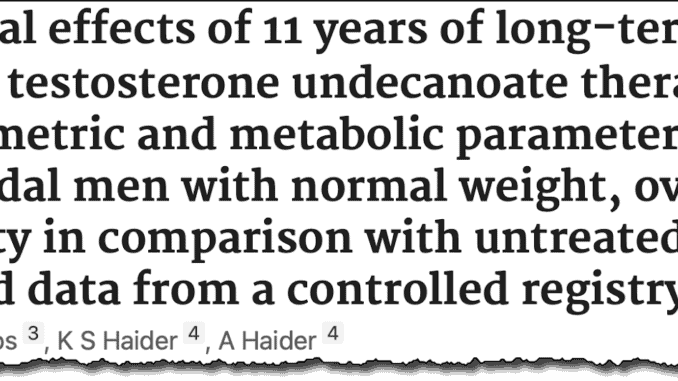
Here’s what I think
Unsubscribe | Report as spam | Change email preferences
Is testosterone supplementation harmful?
Hey, Matt Cook here, and I find it absolutely bonkers — but testosterone supplementation has become controversial in some circles.
It is true that done incorrectly, testosterone can lead to elevated estrogen, which can cause health problems.
But low testosterone affects every aspect of a man’s health.
Studies which have looked at long-term testosterone supplementation in men with low T find a wide range of benefits.
The study below found that long-term testosterone supplementation decreased body weight, waist circumference, blood pressure, fasting blood sugar, and HbA1c.
Most importantly, men who did not take testosterone were 3 times more likely to die…
…even though the untreated group was slightly smaller than the group which was given testosterone.
The human study was carried out by researchers in Germany and the United States. The paper was published in The International Journal of Obesity.
Testosterone is becoming more widely known for its anti-obesity and pro-metabolic effects, and this research was done by obesity experts.
“Obesity is a chronic disease, warranting long-term medical intervention.”
The researchers were wondering whether testosterone could be a significant player in the fight against obesity.
Obese men generally have low testosterone.
“We evaluated effects of testosterone (T) therapy in men with T deficiency with normal weight, overweight and obesity on anthropometric and metabolic parameters, compared with untreated men.”
The researchers recruited over 800 men for the study – all of the men had low testosterone (they were hypogonadal).
“Hypogonadal men with (age: 50-70) participated in an ongoing registry study.”
Most of the men in the study were obese – less than 10% were normal weight.
“Among these men (58%) were obese, (34%) overweight and (8%) had normal weight.”
The researchers treated just over half the men with testosterone undecanoate injections.
“T undecanoate injections were administered to 428 men and 395 remained untreated.”
The men were brought in for an examination twice a year. Some of the men were tracked for as long as 11 years.
The researchers took into account other variables which may be responsible for altering body weight and blood test results.
“Anthropometric and metabolic parameters were measured at least twice a year and changes adjusted for confounding factors to account for baseline differences between groups.”
The researchers found clear improvements in metabolic health.
Testosterone-supplementing men weighed less and their waist size decreased significantly.
“Long-term testosterone therapy in hypogonadal men, irrespective of weight at baseline, produced improvements in body weight, waist circumference and body mass index (BMI).”
Waist circumference is an excellent marker of overall health.
Common tests of metabolic health showed that testosterone helps to regulate energetic metabolism in men.
“Furthermore, testosterone therapy decreased fasting blood glucose and HbA1c and improved lipid profiles.”
Blood pressure came down in low testosterone men who were supplemented with the hormone.
“Gradual decreases in blood pressure (systolic and diastolic) and pulse pressure occurred in men treated with testosterone in each group.”
Research in the last couple of decades has shown that testosterone protects the blood vessels and the organs of the body – including the heart.
There were significant reductions in cardiovascular events and overall death rates in men given testosterone – compared to those with untreated low T levels.
“Marked reductions in mortality and major cardiovascular events were recorded in men receiving testosterone therapy.”
Optimizing testosterone has a remarkable effect on metabolic and cardiovascular health.
“Our findings demonstrate that testosterone therapy produces reductions in weight, waist circumference, and BMI.”
Death rates were 3 times higher in men with untreated low testosterone.
“There were 77 (19.5%) deaths in the untreated groups and 23 (5.4%) in the T-groups.”
Testosterone may be the missing link for many men trying to solve metabolic and cardiovascular problems.
The important thing is to keep estrogen in mind.
Driving testosterone too high can lead to an increase in inflammatory estrogen – giving you other problems.
“Long-term testosterone therapy in overweight and obese hypogonadal men produces progressive and sustained clinically meaningful weight loss.”
Optimizing testosterone can save lives.
“Testosterone therapy may contribute to reductions in mortality and incident major adverse cardiovascular events.”
You should always consult a healthcare practitioner about treating and diagnosing health-related problems.


